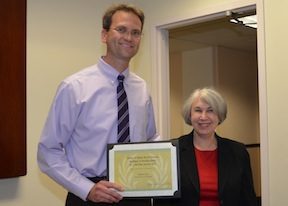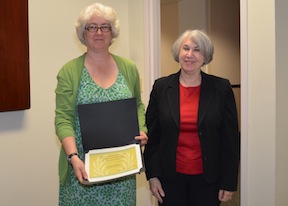College Honors Lecturers for Teaching Excellence

Two lecturers who are known for their dedication to students have been named recipients of the College of Liberal Arts & Sciences awards for teaching excellence among lecturers. The award winners are Topher Gee, Department of Biology, who received the Full-time Lecturer Award for Teaching Excellence; and Carol Higham, Department of History, who received the Part-time Lecturer Award for Teaching Excellence.
A reception on Monday, April 29 honored Gee and Higham and the other nominees for the awards. Other nominees for the full-time lecturer award were Debbie Kilby Baker, communication studies; Pedram Leilabady, physics and optical science; Shep McKinley, history; Mary Michael, psychology; and Susan Michael, chemistry.
Other nominees for the part-time lecturer award were Sarah Minslow, English; Monica Rabinovich, chemistry; and Ellyn Ritterskamp, philosophy.
Department chairs and program directors in the college nominate lecturers for these annual awards. The selection committee comprises committee Chair Jamie Strickland, Department of Geography and Earth Sciences; Lawrence Calhoun, Department of Psychology; Isaac (Ike) Heard, Department of Geography and Earth Sciences; Harold Reiter, Mathematics and Statistics; and Joanne Robinson, Religious Studies.
About the honorees:
Topher Gee is the recipient of the College’s Full-Time Lecturer Award for Teaching Excellence. Gee has been a full-time lecturer in the Department of Biology since 2007. In addition to the undergraduate courses he teaches, he has taught Developmental Biology at the 4000/5000 level, as an elected associate member of the Biology Graduate Faculty.
He has focused on recruiting, retaining and graduating biology majors through enrichment and senior seminars and direct advising. He serves on Honor’s Research and Master’s Research committees, including that of a student who was one of five in North Carolina to win the Barry M. Goldwater Scholarship.
He participates in campus and community outreach, such as with the Center for Teaching and Learning, Majors’ Day, the North Carolina Academy of Sciences, WFAE and community colleges. He led the department’s undergraduate committee and is part of program and curriculum reviews. In those roles, he has initiated the revamping of lab offerings and the development of a seminar to improve scientific reading and writing for newly declared majors. He received the 2011 “Building Educational Strengths and Talents, Outstanding Faculty Award” and was named a National Academies Education Fellow for 2012-2013. He also presented a paper at the Introductory Biology Project Meeting in 2012, which was invitation only.
 Carol Higham is the recipient of the College’s Part-time Lecturer Award for Teaching Excellence. Carol is an adjunct instructor in the history department, from 2009 to today, and earlier from 2003 to 2006. She is an experienced teacher, having been an assistant professor at Texas A&M University. She is a superb instructor who connects extremely well with students and who teaches a variety of courses focused primarily on Native American history and the West.
Carol Higham is the recipient of the College’s Part-time Lecturer Award for Teaching Excellence. Carol is an adjunct instructor in the history department, from 2009 to today, and earlier from 2003 to 2006. She is an experienced teacher, having been an assistant professor at Texas A&M University. She is a superb instructor who connects extremely well with students and who teaches a variety of courses focused primarily on Native American history and the West.
One colleague who visited one of her classes noted that she had “created a very open and inviting learning environment” and that “the vast majority of students appear very motivated and eager to learn, especially so for an 8 a.m. class.”
She regularly receives high marks from students for her effectiveness and for the amount they have learned. In one methodology course that is required of all history majors, students learn how to “do history.” They learn how to research and write effectively, how to interpret primary documents, and how to understand historians’ arguments and develop their own. Carol received three perfect scores from students and an almost perfect score in the fourth class she taught.
She also is a scholar, with an active research agenda that enriches her teaching. She publishes regularly, including co-authorship of a textbook on frontier history. Her colleagues describe her as being “adept at challenging and connecting” with students.
About the full-time lecturers nominees:
Debbie Kilby Baker has been a lecturer in communication studies for 12 years. Her peers and students describe her as energetic, knowledgeable and personable, while also being demanding and challenging of her students. She weaves service in the community into her classes, which have assisted non-profits such as A Child’s Place, Second Harvest Food Bank and the Humane Society. She took the lead in creating the Communication Studies Student Association and developed a departmental Adjunct Faculty Handbook. She also has facilitated workshops with the Summer Diversity Institute, the Office of Disability Services and other efforts. Peers say she embodies the philosophy of teacher-citizen.
Pedram Leilabady has been on the faculty in the Department of Physics and Optical Science since 2004 and currently holds the rank of senior lecturer. He has led the departmental efforts on large course redesign, which has been implemented in all four of the department’s large introductory courses. He invested significant effort in developing on-line components and problem-solving exercises for these classes. Students have benefited from his efforts, as seen by the reduction in the percentage of D, F and W grades and improvement of learning outcomes. He also brings his technical expertise to the department, as someone who has through his career amassed over 75 technical publications and 11 patents.
Shep McKinley is a lecturer in history and has been at UNC Charlotte for 10 years. He has led in incorporating new technologies, developing on-line courses and working with the College of Education to meet the needs of prospective history teachers. He has stepped up in an advisor role, including coordinating the Patterson Prize for best undergraduate paper, running the History Honors Society and advising students with idiosyncratic forms and those assigned to a faculty member on leave. He was a founding member of the Charlotte Teachers Institute and a leading participant in the Teaching American History grant with Cleveland County Schools. He has published one co-authored book and is close to finishing another manuscript.
Mary Michael joined the Psychology Department in 2007, teaching some of the more demanding and intensive content courses. She has regularly expanded class sizes to accommodate student demand, while maintaining favorable evaluations. She mentors in research 6 to 9 undergraduates each year. Her active lab researches individual differences in cognitive processing, and her students regularly present at conferences and submit research for publication. She also has led the study abroad program to Kingston, England for two years, which has encouraged others to follow her lead. She serves on committees focused on issues such as curriculum and study abroad and has edited an undergraduate journal for three years.
Susan Michael has taught a variety of lecture and laboratory course, serving as a part-time lecturer from 1999 to 2007 and a full-time visiting lecturer the following year. When hired as a full-time lecturer in 2008, she immediately took on the role as coordinator of the introductory organic chemistry laboratories while continuing to teach. She updated the laboratory manuals and supervised the graduate students teaching the labs. Susan worked with other faculty in large course redesign of CHEM 1251, creating videos and quizzes to improve student learning and reduce the percentages of D, F, and W grades. She also participated in the Top 40 Freshman Success Academy and served as Advising Coordinator.
About the part-time lecturers nominees:
Sarah Minslow began teaching in the English Department as a part-time faculty member in 2011. She has quickly established herself as a versatile and highly professional faculty member who can teach a variety of English courses well. She also teaches for the Department of Global, International and Area Studies, focused on war, genocide and refugees as reflected in literature and film. She has drawn from her participation in the Silberman Seminar, sponsored by the U.S. Holocaust Memorial Museum. Sarah also has extended her involvement to the community, serving as a keynote speaker for a Charlotte Mecklenburg Library “Banned Books Week” event and a panelist during an event focused on strong women in literature, film and popular culture.
Monica Rabinovich has taught in the Chemistry Department since 1997. She has instructed labs for pre-nursing majors and for science, engineering and pre-health majors. She also has taken on responsibility for a course that prepares graduate students to teach introductory chemistry labs. In this role, she mentors the graduate assistants and deals with the management of the labs, including manuals, equipment, supplies and problems. The graduate students meet weekly to discuss the next week’s experiment, conduct it themselves and take turns presenting the pre-lab lectures, so she can advise them on improvements. Last fall, she oversaw 38 sections, affecting over 1,200 undergraduate students’ experiences.
Ellyn Ritterskamp has taught Introduction to Philosophy and Ethical issues in the Philosophy Department for 10 years. She balances her teaching with a full-time job with The Charlotte Observer and has several times stepped in to teach extra classes when other faculty could not. Her students praise her skillful use of class discussions, group work and presentations, use of videos and clear presentation. As one student said, “Class discussions are always interesting. When talking about any topic, she encourages all views and makes everyone feel as though their opinion matters.” Ellyn shows support for students in other ways as well, including the development and support of a scholarship for philosophy majors.